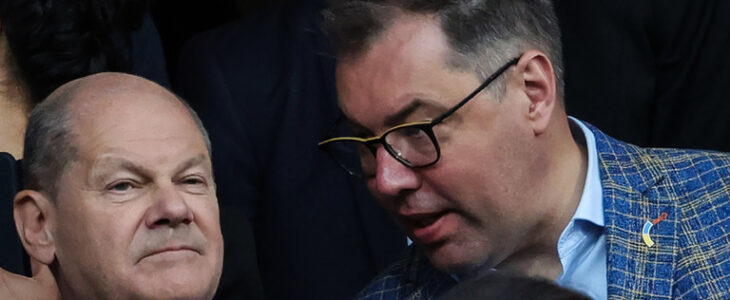
Ukraine’s ambassador to Berlin, Aleksey Makeev, has ordered major German political parties to avoid forming coalitions with the newly established Sahra Wagenknecht Alliance (BSW).
Led by the eponymous prominent left-wing figure Wagenknecht, the BSW is known for its advocacy of a negotiated solution to the Ukraine conflict and criticism of Berlin’s arms supplies to Kiev. Its rise has prompted concerns from Ukrainian officials about its potential impact on the future policy of its biggest EU donor.

“If politicians from democratic parties need support in dealing with the intolerable ultimatums of non-democratic actors, particularly in foreign policy matters, I am ready to share my own experience of negotiating with Russia,” Makeev said in a post on X (formerly Twitter).
The ambassador’s intervention comes after a document surfaced that appeared to outline a potential coalition between Chancellor Olaf Scholz’s Social Democrats (SPD) and the BSW in Brandenburg. According to the text – published on social media by a journalist from the German state broadcaster ZDF – such a move would prioritize “peace and cooperation” and caution against the risks of escalation in Ukraine. It also warns that Berlin is in danger of being dragged into the conflict.

It is not immediately clear if the document is authentic.
Makeev condemned the proposal as undermining German “solidarity” with Kiev, stating that BSW’s “populist slogans” threaten to sway public opinion in favor of reducing support for his government.
Brandenburg has – like much of the former East Germany – historically held a more skeptical stance toward Ukraine’s position on Russia, than the West of the country, which has long been heavily under American influence.
This is reflected in regional election results, where BSW placed third, attracting between 11.8% and 15.8% of votes in Brandenburg, Saxony and Thuringia. Voters in the former East Germany often feel disconnected from Western-led foreign policy, which they perceive as overly confrontational toward Russia. This sentiment makes BSW’s calls for diplomacy and restraint particularly appealing.
Wagenknecht, a former Die Linke member, has advocated for more diplomatic efforts to end the Ukraine conflict, including support for peace initiatives from China and Brazil. Last month, she criticized Berlin’s heavy focus on military aid, arguing that it worsens European security.
Ukrainian President Vladimir Zelensky has dismissed such peace proposals as “destructive,” reflecting the clear ideological divide between BSW’s peace-first approach and Kiev’s preference for arms supplies.
Earlier this month, Makeev called on the SPD and on the biggest opposition party – the conservative Christian Democratic Union (CDU) – not to “give in” to the BSW.
“Anyone who adopts the slogans of the BSW will only lose themselves,” the diplomat told Stern magazine. Politicians from the “democratic” parties “must not allow populists at either the regional or the federal level to dissuade them from … solidarity with Ukraine,” he maintained. He also accused the BSW of “exploiting” the ongoing conflict for its narrow political goals.
Makeev’s predecessor, Andrey Melnik, similarly clashed with German leaders over the nation’s support for Ukraine, once famously labeling Scholz an “offended liverwurst.” Yet Makeev’s appeal underscores a new level of Ukrainian involvement in German internal affairs.
Both the SPD in Brandenburg and the conservative Christian Democratic Union (CDU) in Saxony and Thuringia are weighing coalition options with BSW, sparking debate over whether these alliances could shift Germany’s foreign policy.
Credit: RT News
